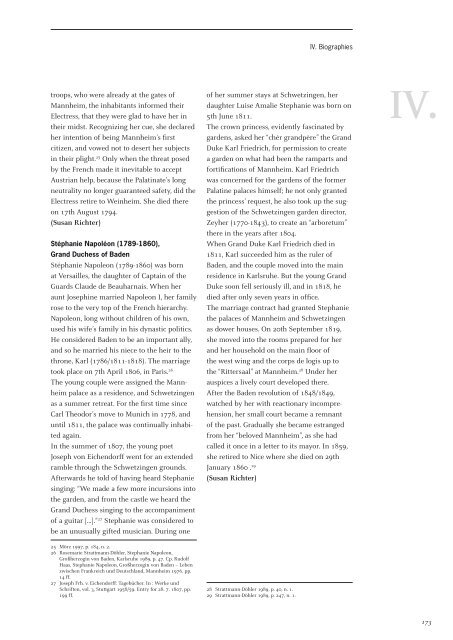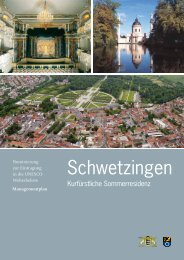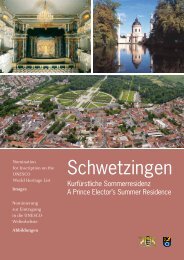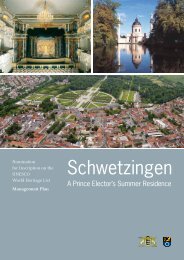II. - Schloss Schwetzingen
II. - Schloss Schwetzingen
II. - Schloss Schwetzingen
You also want an ePaper? Increase the reach of your titles
YUMPU automatically turns print PDFs into web optimized ePapers that Google loves.
troops, who were already at the gates of<br />
Mannheim, the inhabitants informed their<br />
Electress, that they were glad to have her in<br />
their midst. Recognizing her cue, she declared<br />
her intention of being Mannheim’s fi rst<br />
citizen, and vowed not to desert her subjects<br />
in their plight. 25 Only when the threat posed<br />
by the French made it inevitable to accept<br />
Austrian help, because the Palatinate’s long<br />
neutrality no longer guaranteed safety, did the<br />
Electress retire to Weinheim. She died there<br />
on 17th August 1794.<br />
(Susan Richter)<br />
Stéphanie Napoléon (1789-1860),<br />
Grand Duchess of Baden<br />
Stéphanie Napoleon (1789-1860) was born<br />
at Versailles, the daughter of Captain of the<br />
Guards Claude de Beauharnais. When her<br />
aunt Josephine married Napoleon I, her family<br />
rose to the very top of the French hierarchy.<br />
Napoleon, long without children of his own,<br />
used his wife’s family in his dynastic politics.<br />
He considered Baden to be an important ally,<br />
and so he married his niece to the heir to the<br />
throne, Karl (1786/1811-1818). The marriage<br />
took place on 7th April 1806, in Paris. 26<br />
The young couple were assigned the Mannheim<br />
palace as a residence, and <strong>Schwetzingen</strong><br />
as a summer retreat. For the fi rst time since<br />
Carl Theodor’s move to Munich in 1778, and<br />
until 1811, the palace was continually inhabited<br />
again.<br />
In the summer of 1807, the young poet<br />
Joseph von Eichendorff went for an extended<br />
ramble through the <strong>Schwetzingen</strong> grounds.<br />
Afterwards he told of having heard Stephanie<br />
singing: “We made a few more incursions into<br />
the garden, and from the castle we heard the<br />
Grand Duchess singing to the accompaniment<br />
of a guitar […].“ 27 Stephanie was considered to<br />
be an unusually gifted musician. During one<br />
25 Mörz 1997, p. 184, n. 2.<br />
26 Rosemarie Strattmann-Döhler, Stephanie Napoleon,<br />
Großherzogin von Baden, Karlsruhe 1989, p. 47. Cp. Rudolf<br />
Haas, Stephanie Napoleon, Großherzogin von Baden – Leben<br />
zwischen Frankreich und Deutschland, Mannheim 1976. pp.<br />
14 ff.<br />
27 Joseph Frh. v. Eichendorff: Tagebücher. In : Werke und<br />
Schriften, vol. 3, Stuttgart 1958/59. Entry for 28. 7. 1807, pp.<br />
199 ff.<br />
IV. Biographies<br />
of her summer stays at <strong>Schwetzingen</strong>, her<br />
daughter Luise Amalie Stephanie was born on<br />
5th June 1811.<br />
The crown princess, evidently fascinated by<br />
gardens, asked her “chèr grandpère” the Grand<br />
Duke Karl Friedrich, for permission to create<br />
a garden on what had been the ramparts and<br />
fortifi cations of Mannheim. Karl Friedrich<br />
was concerned for the gardens of the former<br />
Palatine palaces himself; he not only granted<br />
the princess’ request, he also took up the suggestion<br />
of the <strong>Schwetzingen</strong> garden director,<br />
Zeyher (1770-1843), to create an “arboretum”<br />
there in the years after 1804.<br />
When Grand Duke Karl Friedrich died in<br />
1811, Karl succeeded him as the ruler of<br />
Baden, and the couple moved into the main<br />
residence in Karlsruhe. But the young Grand<br />
Duke soon fell seriously ill, and in 1818, he<br />
died after only seven years in offi ce.<br />
The marriage contract had granted Stephanie<br />
the palaces of Mannheim and <strong>Schwetzingen</strong><br />
as dower houses. On 20th September 1819,<br />
she moved into the rooms prepared for her<br />
and her household on the main fl oor of<br />
the west wing and the corps de logis up to<br />
the “Rittersaal” at Mannheim. 28 Under her<br />
auspices a lively court developed there.<br />
After the Baden revolution of 1848/1849,<br />
watched by her with reactionary incomprehension,<br />
her small court became a remnant<br />
of the past. Gradually she became estranged<br />
from her “beloved Mannheim”, as she had<br />
called it once in a letter to its mayor. In 1859,<br />
she retired to Nice where she died on 29th<br />
January 1860 . 29<br />
(Susan Richter)<br />
28 Strattmann-Döhler 1989, p. 40, n. 1.<br />
29 Strattmann-Döhler 1989, p. 247, n. 1.<br />
IV.<br />
173






